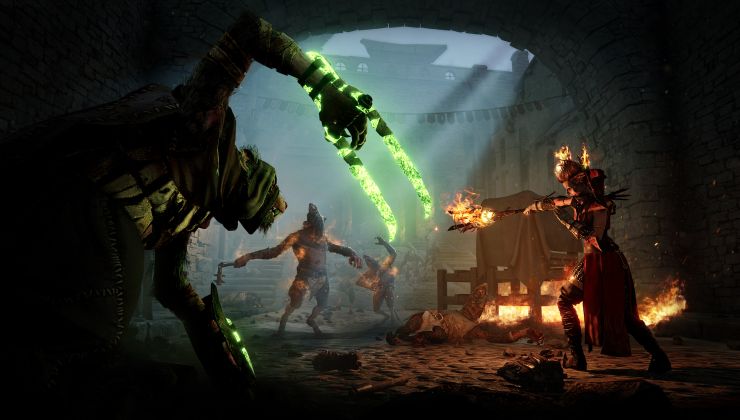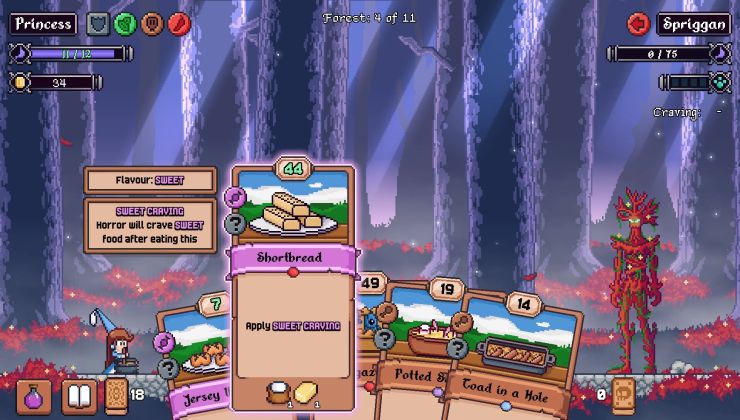Helping to build a huge community around the upcoming Steam Deck handheld, Valve has helpfully released the CAD files for the external shell.
As Valve said on Twitter it's "Good news for all the tinkerers, modders, accessory manufacturers, or folks who just want to 3D print a Steam Deck to see how it feels: We've published CAD files of the external shell for download", to which amusingly dbrand replied with "So... no C&D then?" (C&D being Cease and Desist) since they announced their Project Killswitch case.
Valve did similar for the Steam Controller back in 2016. Hopefully with this move, we will see a much bigger tinkering community spring up around it. They continue to show just how much more open they are when compared with the likes of Microsoft, Sony and Nintendo.
The files are on their own GitLab under the Creative Commons license.
Yeah, they flag compatibility kludges as "hacks"- this is good. It means they are conscious of what is clean and what not.Because I didn't know kludge, some back translations: mess, botched-job, goof, bad job. In other words: Ugly code which never could be upstreamed, quick fixes. And no, it's not about hooks into anything, it's code to make something run. I mean, they're even execute/skip code based on the game id. To sum up, as I said: It's indeed full of hacks & contains code that will not be available to everyone (i.e. upstream Wine).
You seem to imply that Proton development is not benefitting wine.No, I'm saying that there is nothing special about anything Valve is doing. But yes, not all they're doing is helping Wine in any way.
EDIT: Ignore everything I said, I think we have a communication gap here. Can you explain why what Valve is doing is the wrong way? Because from where I sit it's just open source functioning as intended.The right way for an open source project is obviously to write code which can actually contributed to the upstream project (e.g. DXVK does not fall into this category) and avoid forks as much as possible (vkd3d-proton seems to go in the wrong direction, too).
To go back: "Wine chose not to": That's exactly what a bad contribution sounds like. You don't dump code & expect everyone to be thankful for it.
Valve isn't primarily a software company though. If you write 5% as much software as another company, but contribute 30% as much to open source, and in more key areas, who is more open source friendly?Where do you get your numbers from? And in what world is Proton a key area?
And of course it's much smaller, but the main thing is just that this is an apples/oranges comparison. Apple and Microsoft do open source contributions mainly when they have no other choice; it's just that they do so much business that revolves around areas that have been taken over, despite their determined resistance, by open source software that the number of areas where they've had no other choice is quite large.Apple, for example, actively contributes to LLVM which is a key area. And they don't have to because the license allows closed source forks. The same is true for Swift: They could've kept it closed & it would still be "successful" due iOS. But they decided to open it.
And I don't think what you're saying is true. Most open source projects nowadays use permissive licenses. So, yes, they pretty much have a choice.
And as I said: Apple & Microsoft are just prime examples of "evil" proprietary companies. Open source contributions are nothing special.
Valve actually chooses to use open source, and do it responsibly, in areas where they would have other choices.Please enlighten me about the alternatives to Wine? Isn't it actually the other way around: Valve didn't have any other choice but use an existing LGPL project.
Cool. Now imagine if the very operating system the thing ran on was open source too . . . oh wait. Um, and what if the 'secret sauce' it used to run Windows games was . . . oh, it is too, huh?It really is, except for Gabe Newell in the position of CEO there are no formally fixed positions in the company, employees flexibly join workgroups as necessary. This is called ultra-flat because there is no hierarchy and Valve is often referred to as a prime example for this company structure.
Valve is frankly a really weird company. I'm sure all the other companies look at it and think, to quote a certain Dr. from Austin Powers, "Not Evil enough".
Moreover, Ubisoft counts 18.000 employees, EA 11.000... Sony 110.000, Microsoft 180.000... Valve counts 360, but is the largest games platform on PC with somewhere around 80% of PC games being on Steam.
180,000 employees at MS, and not a single one knows how code blocks should work? (At least judging from how shit Teams is...)Cool. Now imagine if the very operating system the thing ran on was open source too . . . oh wait. Um, and what if the 'secret sauce' it used to run Windows games was . . . oh, it is too, huh?It really is, except for Gabe Newell in the position of CEO there are no formally fixed positions in the company, employees flexibly join workgroups as necessary. This is called ultra-flat because there is no hierarchy and Valve is often referred to as a prime example for this company structure.
Valve is frankly a really weird company. I'm sure all the other companies look at it and think, to quote a certain Dr. from Austin Powers, "Not Evil enough".
Moreover, Ubisoft counts 18.000 employees, EA 11.000... Sony 110.000, Microsoft 180.000... Valve counts 360, but is the largest games platform on PC with somewhere around 80% of PC games being on Steam.
Valve really is weird, you would think they would never get anything done with that structure (or lack thereof) yet pretty consistently release winners. People bring up the Steam Machine, but they technically didn't make that, just SteamOS. Which worked just fine for its purpose, but needed Proton, which wasn't a thing until later.
Pretty sure the LLVM work is because gcc is also GPLv3.Yeah, they flag compatibility kludges as "hacks"- this is good. It means they are conscious of what is clean and what not.Because I didn't know kludge, some back translations: mess, botched-job, goof, bad job. In other words: Ugly code which never could be upstreamed, quick fixes. And no, it's not about hooks into anything, it's code to make something run. I mean, they're even execute/skip code based on the game id. To sum up, as I said: It's indeed full of hacks & contains code that will not be available to everyone (i.e. upstream Wine).
You seem to imply that Proton development is not benefitting wine.No, I'm saying that there is nothing special about anything Valve is doing. But yes, not all they're doing is helping Wine in any way.
EDIT: Ignore everything I said, I think we have a communication gap here. Can you explain why what Valve is doing is the wrong way? Because from where I sit it's just open source functioning as intended.The right way for an open source project is obviously to write code which can actually contributed to the upstream project (e.g. DXVK does not fall into this category) and avoid forks as much as possible (vkd3d-proton seems to go in the wrong direction, too).
To go back: "Wine chose not to": That's exactly what a bad contribution sounds like. You don't dump code & expect everyone to be thankful for it.
Valve isn't primarily a software company though. If you write 5% as much software as another company, but contribute 30% as much to open source, and in more key areas, who is more open source friendly?Where do you get your numbers from? And in what world is Proton a key area?
And of course it's much smaller, but the main thing is just that this is an apples/oranges comparison. Apple and Microsoft do open source contributions mainly when they have no other choice; it's just that they do so much business that revolves around areas that have been taken over, despite their determined resistance, by open source software that the number of areas where they've had no other choice is quite large.Apple, for example, actively contributes to LLVM which is a key area. And they don't have to because the license allows closed source forks. The same is true for Swift: They could've kept it closed & it would still be "successful" due iOS. But they decided to open it.
And I don't think what you're saying is true. Most open source projects nowadays use permissive licenses. So, yes, they pretty much have a choice.
And as I said: Apple & Microsoft are just prime examples of "evil" proprietary companies. Open source contributions are nothing special.
Valve actually chooses to use open source, and do it responsibly, in areas where they would have other choices.Please enlighten me about the alternatives to Wine? Isn't it actually the other way around: Valve didn't have any other choice but use an existing LGPL project.
Swift is a computer language... why would anyone release a proprietary one of those?
As others have said, Valve not only contributes code to Wine, they directly pay money into Codeweavers... to develop Wine. Not sure of any other companies that pay for Wine development, do you?
Last edited by slaapliedje on 13 Feb 2022 at 11:00 am UTC
People bring up the Steam Machine, but they technically didn't make that, just SteamOS. Which worked just fine for its purpose, but needed Proton, which wasn't a thing until later.I'm trying to translate: Valve contributes to Wine as a necessity to avoid another failure.
[…]
As others have said, Valve not only contributes code to Wine, they directly pay money into Codeweavers... to develop Wine.
And yes, Steam machines were driven & developed by Valve, they just didn't produce hardware. But it's still Valve's failure since the main components are developed by them (Steam & SteamOS).
Not sure of any other companies that pay for Wine development, do you?No, but this only shows the irrelevance of Wine. Just because Valve & you think it, doesn't mean that it is in general important. Probably 99+% of the gamers world wide (this includes all platforms) are doing just fine without having heard of it.
Pretty sure the LLVM work is because gcc is also GPLv3.Yes, but the question still remains: What does the GPLv3 avoidance have to do with their open source contributions?
Swift is a computer language... why would anyone release a proprietary one of those?It was proprietary. Just like many other languages. Thankfully those times are gone.
As I already said: It is simply nothing special. It's great for you that they contribute to an area you care about. But just don't make it more than it is, they contribute for their own (selfish) reasons.
Valve, having not actually put money into making hardware for the Steam machines, AND still taking what they have learned from their experience with SteamOS and the current madness around the Deck... I would say the Steam Machine test was successful on their end!People bring up the Steam Machine, but they technically didn't make that, just SteamOS. Which worked just fine for its purpose, but needed Proton, which wasn't a thing until later.I'm trying to translate: Valve contributes to Wine as a necessity to avoid another failure.
[…]
As others have said, Valve not only contributes code to Wine, they directly pay money into Codeweavers... to develop Wine.
And yes, Steam machines were driven & developed by Valve, they just didn't produce hardware. But it's still Valve's failure since the main components are developed by them (Steam & SteamOS).
Not sure of any other companies that pay for Wine development, do you?No, but this only shows the irrelevance of Wine. Just because Valve & you think it, doesn't mean that it is in general important. Probably 99+% of the gamers world wide (this includes all platforms) are doing just fine without having heard of it.
Pretty sure the LLVM work is because gcc is also GPLv3.Yes, but the question still remains: What does the GPLv3 avoidance have to do with their open source contributions?
Swift is a computer language... why would anyone release a proprietary one of those?It was proprietary. Just like many other languages. Thankfully those times are gone.
As I already said: It is simply nothing special. It's great for you that they contribute to an area you care about. But just don't make it more than it is, they contribute for their own (selfish) reasons.
Regardless of what you think, a lot of people are able to switch to Linux from Windows solely based upon Codeweavers / Wine / Proton. I put my money where my mouth is and gave Codeweavers 500 bucks. Why? Because I hate booting into Windows, with its garrish colors, and the feeling I don't own my hardware.







 How to set, change and reset your SteamOS / Steam Deck desktop sudo password
How to set, change and reset your SteamOS / Steam Deck desktop sudo password How to set up Decky Loader on Steam Deck / SteamOS for easy plugins
How to set up Decky Loader on Steam Deck / SteamOS for easy plugins
See more from me